|
|
|
Sort Order |
|
|
|
Items / Page
|
|
|
|
|
|
|
| Srl | Item |
| 1 |
ID:
110924
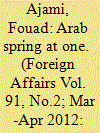

|
|
|
|
|
| Publication |
2012.
|
| Summary/Abstract |
Throughout 2011, a rhythmic chant echoed across the Arab lands: "The people want to topple the regime." It skipped borders with ease, carried in newspapers and magazines, on Twitter and Facebook, on the airwaves of al Jazeera and al Arabiya. Arab nationalism had been written off, but here, in full bloom, was what certainly looked like a pan-Arab awakening. Young people in search of political freedom and economic opportunity, weary of waking up to the same tedium day after day, rose up against their sclerotic masters.
|
|
|
|
|
|
|
|
|
|
|
|
|
|
|
|
| 2 |
ID:
110921


|
|
|
|
|
| Publication |
2012.
|
| Summary/Abstract |
In 2010, U.S. President Barack Obama articulated his vision for the future of American space exploration, which included an eventual manned mission to Mars. Such an endeavor would surely cost hundreds of billions of dollars -- maybe even $1 trillion. Whatever the amount, it would be an expensive undertaking. In the past, only three motivations have led societies to spend that kind of capital on ambitious, speculative projects: the celebration of a divine or royal power, the search for profit, and war. Examples of praising power at great expense include the pyramids in Egypt, the vast terra-cotta army buried along with the first emperor of China, and the Taj Mahal in India. Seeking riches in the New World, the monarchs of Iberia funded the great voyages of Christopher Columbus and Ferdinand Magellan. And military incentives spurred the building of the Great Wall of China, which helped keep the Mongols at bay, and the Manhattan Project, whose scientists conceived, designed, and built the first atomic bomb.
|
|
|
|
|
|
|
|
|
|
|
|
|
|
|
|
| 3 |
ID:
110920
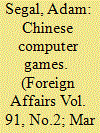

|
|
|
|
|
| Publication |
2012.
|
| Summary/Abstract |
In March 2011, the U.S. computer security company RSA announced that hackers had gained access to security tokens it produces that let millions of government and private-sector employees, including those of defense contractors such as Lockheed Martin, connect remotely to their office computers. Just five months later, the antivirus software company McAfee issued a report claiming that a group of hackers had broken into the networks of 71 governments, companies, and international organizations. These attacks and the many others like them have robbed companies and governments of priceless intellectual property and crucial military secrets. And although officials have until recently been reluctant to name the culprit, most experts agree that the majority of the attacks originated in China.
|
|
|
|
|
|
|
|
|
|
|
|
|
|
|
|
| 4 |
ID:
110926
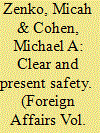

|
|
|
|
|
| Publication |
2012.
|
| Summary/Abstract |
Last August, the Republican presidential contender Mitt Romney performed what has become a quadrennial rite of passage in American presidential politics: he delivered a speech to the annual convention of the Veterans of Foreign Wars. His message was rooted in another grand American tradition: hyping foreign threats to the United States. It is "wishful thinking," Romney declared, "that the world is becoming a safer place. The opposite is true. Consider simply the jihadists, a near-nuclear Iran, a turbulent Middle East, an unstable Pakistan, a delusional North Korea, an assertive Russia, and an emerging global power called China. No, the world is not becoming safer."
|
|
|
|
|
|
|
|
|
|
|
|
|
|
|
|
| 5 |
ID:
110930
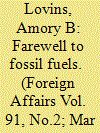

|
|
|
|
|
| Publication |
2012.
|
| Summary/Abstract |
Nearly 90 percent of the world's economy is fueled every year by digging up and burning about four cubic miles of the rotted remains of primeval swamp goo. With extraordinary skill, the world's most powerful industries have turned that oil, gas, and coal into affordable and convenient fuels and electricity that have created wealth, helped build modern civilization, and enriched the lives of billions.
|
|
|
|
|
|
|
|
|
|
|
|
|
|
|
|
| 6 |
ID:
110923
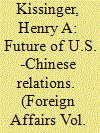

|
|
|
|
|
| Publication |
2012.
|
| Summary/Abstract |
On January 19, 2011, U.S. President Barack Obama and Chinese President Hu Jintao issued a joint statement at the end of Hu's visit to Washington. It proclaimed their shared commitment to a "positive, cooperative, and comprehensive U.S.-China relationship." Each party reassured the other regarding his principal concern, announcing, "The United States reiterated that it welcomes a strong, prosperous, and successful China that plays a greater role in world affairs. China welcomes the United States as an Asia-Pacific nation that contributes to peace, stability and prosperity in the region."
|
|
|
|
|
|
|
|
|
|
|
|
|
|
|
|
| 7 |
ID:
110929
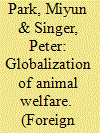

|
|
|
|
|
| Publication |
2012.
|
| Summary/Abstract |
The Universal Declaration of Human Rights, adopted in 1948, articulates the idea that it is wrong to exclude any member of the human species from the circle of moral concern. This enlightened vision was a tremendous advance over earlier, more restricted views about who matters morally; yet it still excludes a far larger number of beings who can both enjoy life and suffer: nonhuman animals. They, or at least those capable of feeling pain, which at a minimum includes all vertebrates, are also entitled to concern. Pain is pain, irrespective of the species of the being that experiences it.
|
|
|
|
|
|
|
|
|
|
|
|
|
|
|
|
| 8 |
ID:
110922


|
|
|
|
|
| Publication |
2012.
|
| Summary/Abstract |
A Feb. 29 update to the print story from the March/April issue: In the wake of the Great Recession it would seem natural that the 2012 election would be fought over economic issues. Yet so far in the Republican primaries, we have seen social issues, and religion especially, move to the forefront. Rick Santorum is only the latest in a series of Republicans who have infused their campaigns with talk about God. Even Mitt Romney, a Mormon who has generally tried to avoid discussing religion, has recently pledged to defend "religious liberty" against the Obama administration. Increasingly, the rhetoric of the leading Republican contenders echoes the Republican fringe of twenty years ago. Then, we heard Pat Buchanan -- the quintessential protest candidate -- bombastically declare that America was in the midst of a culture war. Today, the frontrunners all play to the Republican base by describing the White House's "war on religion."
|
|
|
|
|
|
|
|
|
|
|
|
|
|
|
|
| 9 |
ID:
110927
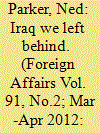

|
|
|
|
|
| Publication |
2012.
|
| Summary/Abstract |
Nine years after U.S. troops toppled Saddam Hussein and just a few months after the last U.S. soldier left Iraq, the country has become something close to a failed state. Prime Minister Nouri al-Maliki presides over a system rife with corruption and brutality, in which political leaders use security forces and militias to repress enemies and intimidate the general population. The law exists as a weapon to be wielded against rivals and to hide the misdeeds of allies. The dream of an Iraq governed by elected leaders answerable to the people is rapidly fading away.
|
|
|
|
|
|
|
|
|
|
|
|
|
|
|
|
| 10 |
ID:
110918
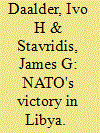

|
|
|
|
|
| Publication |
2012.
|
| Summary/Abstract |
NATO's operation in Libya has rightly been hailed as a model intervention. The alliance responded rapidly to a deteriorating situation that threatened hundreds of thousands of civilians rebelling against an oppressive regime. It succeeded in protecting those civilians and, ultimately, in providing the time and space necessary for local forces to overthrow Muammar al-Qaddafi. And it did so by involving partners in the region and sharing the burden among the alliance's members.
NATO's involvement in Libya demonstrated that the alliance remains an essential source of stability. But to preserve that role, NATO must solidify the political cohesion and shared capabilities that made the operation in Libya possible -- particularly as its leaders prepare for the upcoming NATO summit in Chicago this May.
|
|
|
|
|
|
|
|
|
|
|
|
|
|
|
|
| 11 |
ID:
110919


|
|
|
|
|
| Publication |
2012.
|
| Summary/Abstract |
Running down the list of the U.S. State Department's Latin America policy objectives in El País in September 2010, the economist Moisés Naím noted that they focused almost exclusively on domestic concerns: building democratic institutions, promoting local social and economic opportunity, and so forth. These issues were not only given a higher priority in policy toward Latin America than they were for other regions, but they were also issues largely beyond Washington's ability to control.
|
|
|
|
|
|
|
|
|
|
|
|
|
|
|
|
| 12 |
ID:
110928
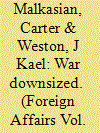

|
|
|
|
|
| Publication |
2012.
|
| Summary/Abstract |
The United States, facing deepening economic and fiscal woes at home, is preparing to withdraw from Afghanistan. More and more policymakers, congressional representatives, and members of the public are calling for the majority of U.S. forces to pull out as quickly as possible and for Washington to shift from an expensive counterinsurgency strategy, in which tens of thousands of U.S. and NATO troops protect the Afghan population, to a cheaper counterterrorism strategy, in which special operations forces strike at terrorist leaders in Afghanistan and Pakistan and the Afghans are left largely on their own.
|
|
|
|
|
|
|
|
|
|
|
|
|
|
|
|
| 13 |
ID:
110925


|
|
|
|
|
| Publication |
2012.
|
| Summary/Abstract |
In 2007, the World Bank was in crisis. Some saw conflicts over its leadership. Others blamed the institution itself. When the International Bank for Reconstruction and Development, the cornerstone of what became the World Bank Group, was founded in 1944, poor and war-torn countries had little access to private capital. Sixty years later, however, private-sector financial flows dwarfed public development assistance. "The time when middle-income countries depended on official assistance is thus past," Jessica Einhorn, a former managing director of the World Bank wrote in these pages in 2006, "and the IBRD seems to be a dying institution." In roundtable discussions and op-ed pages, the question was the same: Do we still need the World Bank?
|
|
|
|
|
|
|
|
|
|
|
|
|
|
|
|
|
|
|
|
|